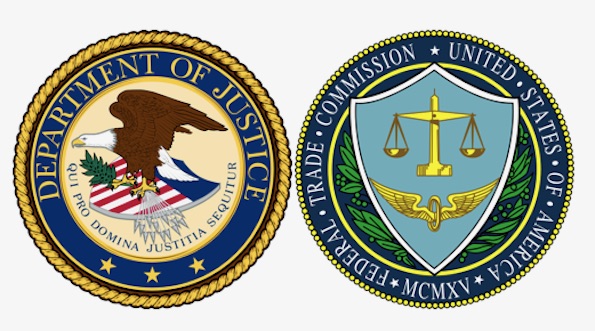Showing results for: “sirius xm merger”
Kolasky: The DOJ and FTC Should Revise Their Proposed Vertical Merger Guidelines to Emulate the EU’s
On January 10, the Department of Justice (DOJ) withdrew the 1984 DOJ Non-Horizontal Merger Guidelines, and, together with the Federal Trade Commission (FTC), released new draft 2020 Vertical Merger Guidelines (“DOJ/FTC draft guidelines”) on which it seeks public comment by February 26.[1] In announcing these new draft guidelines, Makan Delrahim, the Assistant Attorney General for ... Kolasky: The DOJ and FTC Should Revise Their Proposed Vertical Merger Guidelines to Emulate the EU’s
Nuechterlein: Guidelines without Guidance on Vertical Mergers
[TOTM: The following is part of a symposium by TOTM guests and authors on the 2020 Vertical Merger Guidelines. The entire series of posts is available here. This post is authored by Jonathan E. Nuechterlein (Partner, Sidley Austin LLP; former General Counsel, FTC; former Deputy General Counsel, FCC).] [Nuechterlein: I represented AT&T in United States ... Nuechterlein: Guidelines without Guidance on Vertical Mergers
Hovenkamp: The Draft Vertical Merger Guidelines Are an Important Step for the Economic Analysis of Mergers
In its 2019 AT&T/Time-Warner merger decision the D.C. Circuit Court of Appeals mentioned something that antitrust enforcers have known for years: We need a new set of Agency Guidelines for vertical mergers. The vertical merger Guidelines were last revised in 1984 at the height of Chicago School hostility toward harsh antitrust treatment of vertical restraints. ... Hovenkamp: The Draft Vertical Merger Guidelines Are an Important Step for the Economic Analysis of Mergers
Welcome to the TOTM Blog Symposium on the 2020 Draft Joint Vertical Merger Guidelines
The 2020 Draft Joint Vertical Merger Guidelines: What’s in, what’s out — and do we need them anyway? February 6 & 7, 2020 Welcome! We’re delighted to kick off our two-day blog symposium on the recently released Draft Joint Vertical Merger Guidelines from the DOJ Antitrust Division and the Federal Trade Commission. If adopted by ... Welcome to the TOTM Blog Symposium on the 2020 Draft Joint Vertical Merger Guidelines
Announcing the TOTM Symposium on the 2020 Draft Joint Vertical Merger Guidelines
Truth on the Market is pleased to announce its next blog symposium: The 2020 Draft Joint Vertical Merger Guidelines: What’s in, what’s out — and do we need them anyway? February 6 & 7, 2020 Symposium background On January 10, 2020, the DOJ Antitrust Division and the Federal Trade Commission released Draft Joint Vertical Merger ... Announcing the TOTM Symposium on the 2020 Draft Joint Vertical Merger Guidelines
The 2020 Draft Joint Vertical Merger Guidelines: What’s in, what’s out — and do we need them anyway?
On January 10, 2020, the DOJ and FTC released their draft 2020 Vertical Merger Guidelines. “Challenging anticompetitive vertical mergers is essential to vigorous enforcement. The agencies’ vertical merger policy has evolved substantially since the issuance of the 1984 Non-Horizontal Merger Guidelines, and our guidelines should reflect the current enforcement approach. Greater transparency about the complex ... The 2020 Draft Joint Vertical Merger Guidelines: What’s in, what’s out — and do we need them anyway?
The Upsides of Collusion and Concentration
Conspiracies and collusion often (always?) get a bad rap. Adam Smith famously derided “people of the same trade” for their inclination to conspire against the public or contrive to raise prices. Today, such conspiracies and contrivances are per se illegal and felonies punishable under the Sherman Act. It is well known and widely accepted that ... The Upsides of Collusion and Concentration
Why the FTC had to Abandon the Duty to Deal Argument Against Qualcomm
On November 22, the FTC filed its answering brief in the FTC v. Qualcomm litigation. As we’ve noted before, it has always seemed a little odd that the current FTC is so vigorously pursuing this case, given some of the precedents it might set and the Commission majority’s apparent views on such issues. But this ... Why the FTC had to Abandon the Duty to Deal Argument Against Qualcomm
Efficient Cartels and the Public Interest Defence – Do They Exist?
The concept of a “good” or “efficient” cartel is generally regarded by competition authorities as an oxymoron. A cartel is seen as the worst type of antitrust violation and one that warrants zero tolerance. Agreements between competitors to raise prices and share the market are assumed unambiguously to reduce economic welfare. As such, even if ... Efficient Cartels and the Public Interest Defence – Do They Exist?
Big Ink vs. Bigger Tech
[TOTM: The following is the fifth in a series of posts by TOTM guests and authors on the politicization of antitrust. The entire series of posts is available here.] This post is authored by Ramsi Woodcock, Assistant Professor, College of Law, and Assistant Professor, Department of Management at Gatton College of Business & Economics, University ... Big Ink vs. Bigger Tech
“Politicization of Antitrust:” An Opportunity
[TOTM: The following is the first in a series of posts by TOTM guests and authors on the politicization of antitrust. The entire series of posts is available here.] This post is authored by Steven J. Cernak, Partner at Bona Law and Adjunct Professor, University of Michigan Law School and Western Michigan University Thomas M. Cooley ... “Politicization of Antitrust:” An Opportunity
Mr. Watson, I Want to See You … About Vertical Mergers and Price Regulation
Jonathan B. Baker, Nancy L. Rose, Steven C. Salop, and Fiona Scott Morton don’t like vertical mergers: Vertical mergers can harm competition, for example, through input foreclosure or customer foreclosure, or by the creation of two-level entry barriers. … Competitive harms from foreclosure can occur from the merged firm exercising its increased bargaining leverage to ... Mr. Watson, I Want to See You … About Vertical Mergers and Price Regulation






